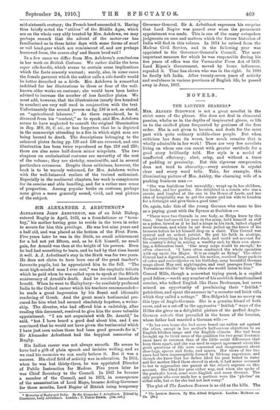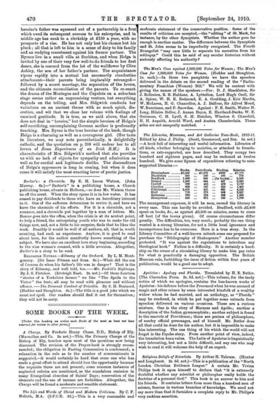NOVELS.
THE LANTERN BEARERS.*
MRS. ALFRED SIDGWICIC is not a great novelist in the strict sense of the phrase. She does not deal in elemental passion, whelm us in the depths of inspissated gloom, or lift us to the exalted plane frequented by geniuses of the first order. She is not given to heroics, and deals for the most part with quite ordinary middle-class people. But when criticism has done its worst, how much remains that is wholly admirable in her work ! There are very few novelists living on whom one can count with greater certitude for a good story brilliantly told. Her style is a model of unaffected efficiency; alert, crisp, and without a trace of padding or preciosity. But this rigorous compression does not tend to obscurity,—every sentence is crystal clear and every word tells. Take, for example, this illuminating picture of Mrs. Ashley, the charming wife of a pushing business man :— "She was fastidious but unworldly: wrapt up in her children, her books, and her garden. She delighted in a cousin who was a curate, and laughed at the one in the House of Lords, and her idea of hospitality was to get the curate and his wife to London for a fortnight and give them a good time."
Or, again, take this of the young German who came to live as a paying guest with the Byrnes at Surbiton "There were two Conrads in one body, as Helga knew by this time. One had served his year in the army, held himself as stiff as a poker, bowed as if he had a. hinge in his back, talked clipped nasal German, and when he sat down pulled up the knees of his trousers before he let himself drop on a chair. This Conrad was cynical and an ardent patriot. He put his faith in airships, thought everything in England slack, and could not account for his country's delay in seizing a wealthy and, by their own show- ing, a defenceless land. ' One army corps would be enough,' he often observed. 'I have often conducted the whole operation with my uncle the Major. It is as simple as flying.' The other Conrad had a digestion, missed his mother, received large packets of cakes and embroideries on his birthday, sang beautiful German songs about May and nightingales, and read passages from ' Die Versunkene Glocke' to Helga when she would listen to him."
Conrad Hille, though a somewhat trying guest, is a capital good fellow,—worth any number of his snobbish denationalised cousins, who talked English like Hans Breitmann, but never missed an opportunity of proclaiming their " Inklish " patriotism, and spent the summer in " a monster red brick villa which they called a cottage." Mrs. Sidgwick has no mercy on this type of Anglo-German. She is a genuine friend of both races, and as a set-off to the aggressive " Inklish " ways of the Mlles she gives us a delightful picture of the perfect Anglo- German entente that prevailed in the home of the heroine, whose father had married a German wife :— " In her own home she bad never heard one nation set against the other, except in her mother's half-serious objections to an English kitchen range and the English climate. She had been brought up to think more of the qualities the two great Teutonic races have in common than of the little social differences that keep them apart, and she was used to expect agreement where the great questions of life were concerned and disagreement about shoe-bags, spoons and forks, and sauces. Her views of the two races had been imperceptibly formed by lifelong experience, and though she knew that her father liked his peas boiled in water and her mother liked them stewed in stock, it had never occurred to her to aggrandize one parent at the other's expense on this account. She liked her peas either way, and when she spoke of the poets she loved, some were English and some German. The only people who ever made her a partisan were the phobes' on either side, but so far she had not met many."
The plot of The Lantern Bearers is as old as the hills. The
• The Lantern Bearers. By Mrs. Alfred Sidgwick. London : Methuen an Co. [138.]
heroine's father was squeezed out of a partnership in a firm. which owed its subsequent success to his enterprise, and in middle age has sunk to a clerkship at £150 a year, with no prospects of a rise. He has not only lost his chance bat his pluck ; all that is left to him is a sense of duty to his family and an undying resentment against his former partner. The Byrnes live in a small villa at Surbiton, and when Helga is invited by one of their very few well-to-do friends to her first dance, she is rescued from the lot of the wallflower by Clive Ashley, the son of her father's partner. The acquaintance ripens rapidly into a mutual but necessarily clandestine attachment—their parents being implacably estranged— followed by a secret marriage, the separation of the lovers, and the ultimate reconciliation of the parents. To re-enact the drama of the Montagus and the Capulets on a suburban stage seems rather an unpromising venture, but everything depends on the telling, and Mrs. Sidgwick conducts her variations on an ancient theme with so much spirit, dis- cretion, and wit that we close her volume with feelings of unmixed gratitude. It is true, as we said above, that she does not deal in " heroics," but the simple heroism of Helga's self-sacrificing, uncomplaining German mother is profoundly touching. Mrs. Byrne is the true heroine of the book, though Helga is a charming as well as a courageous girl. (Her taste in literature, we may note parenthetically, is delightfully catholic, and the quotation on p. 209 will endear her to all lovers of Some Experiences of an Irish R..711.) It is characteristic of Mrs. Sidgwick's method that she provides us with no lack of objects for sympathy and admiration as well as for cordial and legitimate dislike. The discomfiture of Helga's oppressors is long in coming, but when it does come it will satisfy the most exacting lover of poetic justice.











































 Previous page
Previous page